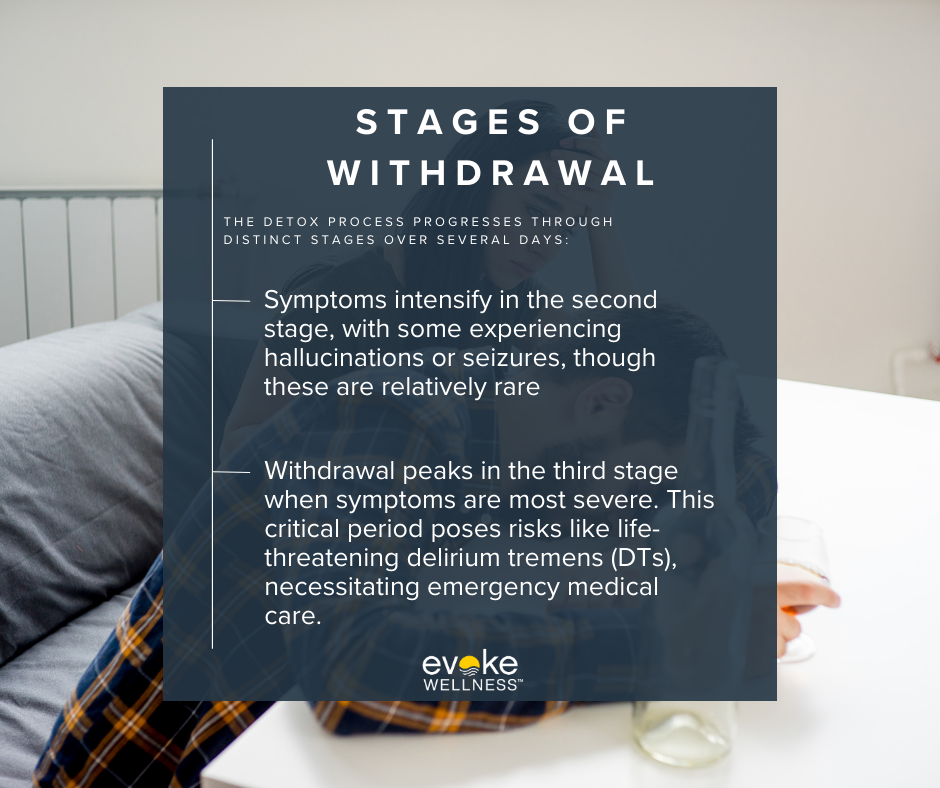Embarking on alcohol detoxification is a crucial first step in your journey to recovery. As you prepare to overcome alcohol addiction, understanding what lies ahead can alleviate anxiety and bolster your commitment. Recent studies show that approximately 14.5 million Americans struggle with alcohol use disorder, underscoring the importance of effective treatment programs. At Evoke Wellness at Cohasset, our comprehensive approach encompasses not only alcohol detox but also addresses co-occurring mental health issues through dual diagnosis treatment. This article will guide you through the detoxification process, outlining the physical and emotional challenges you may face, the support systems available, and the various therapy programs designed to facilitate your transition to long-term sobriety.
Together, let’s embrace the journey to recovery and the promise of a new beginning. Call us at (617) 917-3485 today or reach out online.
Overview of Alcohol Detoxification
Overcoming alcohol addiction starts with the crucial first step of detoxification. As the body rids itself of alcohol’s toxins, intense withdrawal symptoms typically emerge within 8 hours after the last drink. According to Evoke Wellness, common early signs include insomnia, anxiety, nausea, sweating, fatigue, and tremors.
Medically-Supervised Detox
Attempting alcohol detox alone can be extremely dangerous. Evoke Wellness strongly recommends a medically-supervised detox program, where trained staff carefully monitor the process and provide medications to ease withdrawal and prevent complications. Their comprehensive approach utilizes therapies and aftercare planning to address addiction’s physical, psychological, and social aspects.
Lingering Symptoms
Even after acute withdrawal, some may experience lingering issues like mood swings, fatigue, insomnia, and intense alcohol cravings for weeks or months – known as post-acute withdrawal symptoms (PAWS). Continuing treatment through rehabilitation programs is vital for sustained recovery and developing healthy coping strategies.
With over 25% of Massachusetts adults reporting binge drinking, alcohol addiction affects many families. Evoke Wellness provides specialized programs to support alcoholic individuals and their loved ones on the path to lasting sobriety.
What Happens During Alcohol Detox?
The Detox Process
Alcohol detox marks the beginning of recovery from alcohol addiction. As the body rids itself of alcohol, withdrawal symptoms emerge – often within 8 hours after the last drink. Initial symptoms like insomnia, anxiety, nausea, and tremors set in, signaling the detox process has begun.
Escalating Symptoms
In the second stage, symptoms intensify, with some individuals experiencing hallucinations or seizures, though serious complications are relatively uncommon. Proper medical care is crucial during this period to ensure safety.
Peak Withdrawal
The third stage is the peak of alcohol withdrawal, when symptoms are at their worst. This is also when life-threatening conditions like delirium tremens (DTs) can potentially occur, underscoring the importance of professional detox treatment.
Lingering Effects
After the acute withdrawal phase, some may continue experiencing fatigue, insomnia, and mood swings. Comprehensive rehabilitation programs aid in managing these post-acute symptoms while building a strong foundation for sustained recovery.
Medical Supervision
Given the risks involved, alcohol detox is safest when overseen by medical professionals in a dedicated treatment facility. Medications can be administered to alleviate uncomfortable withdrawal effects, while counseling helps address the psychological aspects of addiction.
Timeline and Symptoms of Alcohol Withdrawal
Early Withdrawal
- Within 6-12 hours after the last drink, early withdrawal symptoms begin to set in. These include anxiety, insomnia, nausea, abdominal pain, and loss of appetite.
- Around 12-24 hours, symptoms intensify with headaches, sweating, tremors, and heart palpitations. As reported by the National Library of Medicine, these symptoms are often most severe around 24-48 hours after stopping drinking.
Peak Withdrawal
- Between 48-72 hours, withdrawal peaks with severe physical and psychological symptoms. This includes fever, confusion, agitation, and even hallucinations or seizures in some cases.
- According to a 2019 study, nearly 5% of patients experience delirium tremens (DTs) – the most severe form of alcohol withdrawal characterized by confusion, rapid heartbeat, fever, and hallucinations.
Protracted Withdrawal
- After the first week, most physical symptoms subside, but psychological withdrawal can persist for weeks or months. Fatigue, depression, anxiety, and sleep disturbances are common.
- Per Harvard Health Publishing, 15-30% of people with alcohol dependence develop protracted depression requiring antidepressant treatment.
Seeking professional help at an accredited alcohol detox and rehabilitation center is crucial for managing withdrawal safely and increasing chances of long-term sobriety.
Types of Alcohol Detox Programs
Inpatient Detox Programs
In an inpatient or residential alcohol detox program, you live at the treatment facility and receive 24/7 medical monitoring and support. This ensures a safe detox process as trained staff can administer medications to alleviate severe withdrawal symptoms like tremors, seizures, and delirium tremens (DTs). According to a study, DTs can occur a few days into detox and require immediate medical intervention.
Outpatient Detox Programs
For those with mild to moderate alcohol dependence, an outpatient detox program may be suitable. You attend the facility for scheduled appointments while continuing to live at home. This option is less intensive but still provides medical supervision, counseling, and medications to manage withdrawal safely.
Medication-Assisted Treatment
Many detox programs incorporate medication-assisted treatment (MAT) using FDA-approved drugs like benzodiazepines, which help reduce withdrawal severity and seizure risk. Other medications like anti-seizure meds, nutritional supplements, and over-the-counter remedies may also be used to ease uncomfortable symptoms during detox.
Holistic Detox Approaches
Some alcohol detox centers offer complementary holistic therapies alongside medical treatment. These may include yoga, meditation, acupuncture, massage, and nutritional counseling to support physical and emotional healing during withdrawal. Holistic methods are often combined with evidence-based psychotherapies for a comprehensive mind-body approach.
No matter which type you choose, medically-supervised alcohol detox is crucial for managing potentially life-threatening withdrawal safely. The detox program prepares you for the next stage of addiction treatment and counseling to develop relapse prevention strategies.
Choosing the Right Alcohol Detox Program
Comprehensive Assessment
The first step in choosing the right alcohol detox program is a thorough assessment of your specific needs. A reputable facility will evaluate your medical and mental health history, addiction severity, and any co-occurring disorders. This comprehensive approach ensures you receive personalized care tailored to your unique situation.
Treatment Approach
Look for programs that utilize evidence-based practices and a multidisciplinary team of professionals, including physicians, nurses, therapists, and counselors. The treatment approach should address both the physical and psychological aspects of addiction through a combination of medical detox, therapy, counseling, and aftercare planning.
Quality of Care
Prioritize facilities that are licensed, accredited, and have a proven track record of successful outcomes. Inquire about staff qualifications, patient-to-staff ratios, and the availability of specialized programs or amenities that cater to your specific needs, such as dual diagnosis treatment or gender-specific programs.
Continuum of Care
Consider programs that offer a continuum of care, transitioning from detox to intensive inpatient treatment and then to outpatient or aftercare services. This comprehensive approach increases the likelihood of long-term recovery by providing ongoing support and relapse prevention strategies.
Supportive Environment
A safe, comfortable, and supportive environment can significantly impact your detox experience and recovery journey. Look for facilities with a welcoming atmosphere, private accommodations, recreational activities, and opportunities for family involvement or support group participation.
By carefully evaluating these factors, you can increase your chances of finding an alcohol detox program that aligns with your specific needs and goals, ultimately setting you on the path to lasting sobriety and improved overall well-being.
What to Expect After Alcohol Detoxification
After completing alcohol detox, the road to recovery is just beginning. During detox, the primary focus is safely managing withdrawal symptoms as alcohol leaves the body. Post-detox, individuals transition into comprehensive addiction treatment programs to address the root causes and develop strategies for lasting sobriety.
Building a Recovery Foundation
The next phase involves building a strong foundation through various evidence-based therapies:
- Individual and Group Counseling: Cognitive-behavioral therapy (CBT) helps identify negative thought patterns and replace them with healthier coping mechanisms. Group sessions provide peer support.
- Holistic Therapies: Practices like meditation, yoga, art therapy, and mindfulness complement traditional counseling approaches.
- Life Skills Training: Learning practical skills in areas like stress management, communication, and relapse prevention equips individuals for sober living.
Continuing Care and Support
Recovery is an ongoing process that requires commitment and support. After completing an initial treatment program:
- Intensive Outpatient Programs (IOP) offer step-down care with counseling sessions a few times per week while transitioning back into daily life.
- Sober Living Homes provide a structured, substance-free environment and peer accountability during this adjustment period.
- Support Groups like Alcoholics Anonymous foster community and mentorship from others in long-term recovery.
Throughout this journey, addressing any co-occurring mental health issues through dual diagnosis treatment is crucial for achieving comprehensive healing.
FAQs About Alcohol Detoxification
Common Withdrawal Symptoms
One of the most frequently asked questions about alcohol detox centers around the withdrawal symptoms people can expect. Common side effects include insomnia, anxiety, sweating, nausea, tremors, and even hallucinations or seizures in severe cases. According to Stanford’s Human-Centered AI group, over 14.5 million Americans aged 12 and older had an alcohol use disorder in 2019, highlighting the need for effective detox and treatment options.
Importance of Medical Supervision
Attempting to detox from alcohol alone can be extremely dangerous due to the potentially life-threatening nature of withdrawal symptoms. Evoke Wellness at Cohasset stresses the importance of undergoing medically supervised detox to safely manage this process. Their programs provide 24/7 monitoring, medication to ease symptoms, and support from addiction specialists.
Detox Timeline and Process
The detox timeline can vary, but typically lasts 5-7 days. As outlined on their blog, withdrawal often progresses through three main stages – initial symptoms like insomnia and anxiety, intensifying discomfort peaking around 2-3 days, followed by lingering fatigue and cravings. Evoke’s medical team carefully monitors each client’s progress, adjusting treatment as needed.
Comprehensive Rehab Programs
While detox is a crucial first step, comprehensive rehab programs are essential for achieving long-term sobriety. Evoke offers inpatient, outpatient, and aftercare options that combine counseling, therapy, life skills training, and relapse prevention strategies to support clients throughout their recovery journey.
Conclusion
As you consider embarking on your journey to sobriety, understanding what to expect during alcohol detoxification is crucial. Remember, you’re not alone in this process. Professional support through an alcohol addiction treatment program can significantly improve your chances of successful recovery. With medical supervision, therapy programs, and potentially dual diagnosis treatment, you’ll be equipped to navigate the challenges of detox safely and effectively. Recent studies show that individuals who complete medically supervised detox are 1.5 times more likely to maintain long-term sobriety. By taking this brave first step, you’re paving the way for a healthier, alcohol-free future. Reach out to a reputable treatment center today to begin your transformative path to recovery.
Begin Your Journey with Evoke Wellness at Cohasset
If you or a loved one is considering treatment, Evoke Wellness at Cohasset invites you to contact us. Our compassionate team is ready to answer your questions, discuss your needs, and help you take the first steps toward recovery. In Cohasset, you’ll find more than just a treatment program – you’ll discover a community dedicated to your wellness and success. Together, let’s embrace the journey to recovery and the promise of a new beginning. Call us at (617) 917-3485 today or reach out online.





